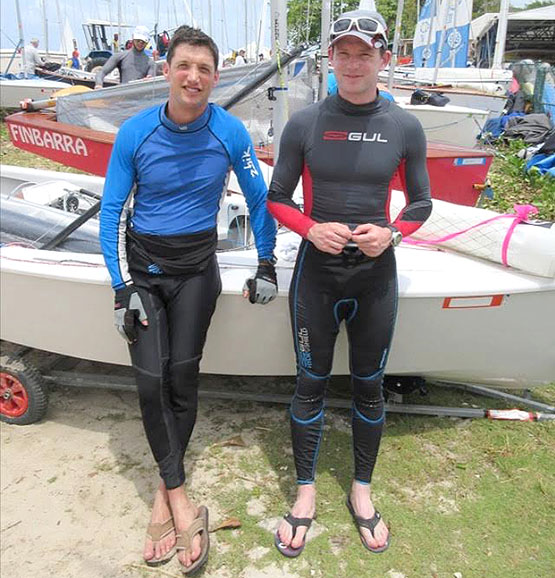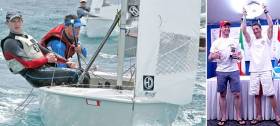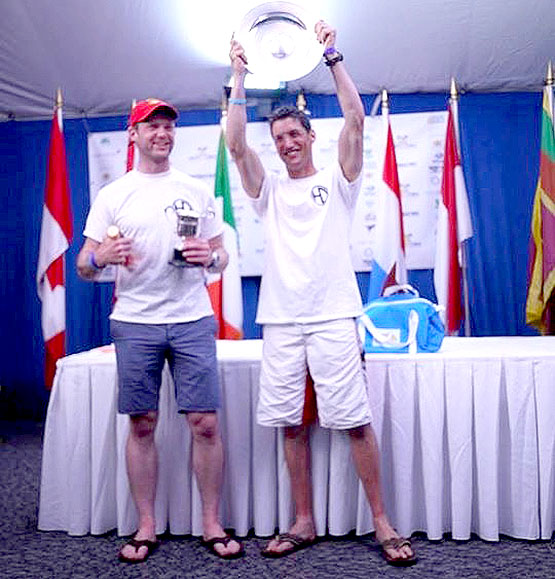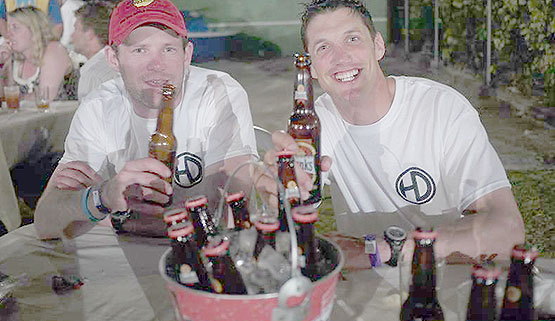Displaying items by tag: Andy Davis
Greystones Sailing Club is saluting its first ever world champions tonight as Shane MacCarthy and Andy Davis lift the GP14 Worlds Trophy on the far side of the Atlantic Ocean at the conclusion of the Barbados hosted week long dinghy championships.
With two races left to sail today any one of three crews could have won the world title but provisional results hand it to the Irish duo. A 22-boat Irish contingent were celebrating the historic win at Barbados Yacht Club, the biggest event the West Indies club has ever held.
Official results were still awaited from organisers but Irish GP14 President Stehpen Boyle has been able to confirm the result for Afloat.ie.
The 105–boat fleet was barely back on the beach in Barbados when the news broke in Wicklow that MacCarthy and sailmaker Davis had done enough for one of the most coveted UK and World dinghy titles. The Wicklow crew outwitted a number of multi–world champions to seize the trophy, Ireland's first GP14 World Title win since 1991.
Boyle told Afloat.ie: ‘This is a fantastic result for Irish dinghy sailing and the GP14 Class in particular. The GP14 World Championship epitomises what small boat racing is about; large scale participation, racing for all ages and levels, and razor sharp competition at the top end. We are absolutely delighted that Shane and Andy have brought the world title back to Ireland’.
While the other contenders for the title won individual races MacCarthy, the current UK and Irish Champion, sailed a very consistent series and was never outside the top three for the duration of the event. Moving into the latter part of championship with four races to go over Sunday & Monday, MacCarthy & Davis were tied in second place with British pair Ian Dobson & Andy Tunnicliffe on 15 points, both two points adrift of the leaders Craig and Lewis of Great Britain on 13 points.
MacCarthy and Davis are the third Irish name on to the Worlds trophy and the first from the Republic. The Fekkes Brothers from Larne in County Antrim last won it in 1991 and Bill Whisker and Jimmy McKee from Ballyholme in County Down were winners in 1975.
The massive championship was hotly contested with the Irish pair prevailing over a star studded field which included reigning five time GP14 World Champions Dobson & Tunnicliffe, former World Champion Neil Marsden, former UK National Champion Mike Senior and multi class World and European Champion Nick Craig sailing with Toby Lewis and widely recognised as Britain’s most successful amateur sailor.

Shane and Andy, the new GP14 World Champions from County Wicklow –– Photo: GP14 class
Shane lifts the world championship trophy, the first Irish winners in a quarter of a century – Photo: Laura McFarland
Never tasted so good – well earned beers in Barbados – Photo: Laura McFarland
22 crews from Ireland travelled to compete in the event which attracted competitors from Sri Lanka, North America, Australia, Barbados and United Kingdom.
Sunday proved decisive with MacCarthy & Davis making their bid for the title scoring a 1st and 2nd for the day to catapult them into the lead four points ahead of Dobson & Tunnicliffe with Craig & Lewis slipping back to third. It was still all to play for heading into Monday with two races to sail and 4 points separating the three crews who could win the prestigious world title but MacCarthy & Davis wrapped it up in Race 9 finishing second to Craig & Lewis with Dobson & Tunnicliffe forced back into 3rd. This is a first Irish win in this prestigious event since the Fekkes brothers in 1991.
John & Donal McGuinness (Moville SC) in 12th were next best Irish, followed by Lough Erne's JP & Carolyn McCaldin in 14th with Sligo YC Keith Louden & Alan Thompson in 20th.
The GP14 is one of Ireland's most popular two person racing dinghy classes and regularly attracts fleets of 40-50+ boats.
Top 10
1st Shane McCarthy Andy Davies
2nd Ian Dobson Andy Tunnicliffe
3rd Nick Craig Tobytastic Lewis
4th Matt Burge Paul Childs
5th Mike Senior Chris White
6th Sam Watson Andy Thompson
7th Graham Flynn Adam Froggatt
8th Neil Marsden Derek Hill
9th Richard Instone Jim Toothill
10th Dave Young Nicola Booth
Team Ireland also took home two other special trophies. Brenda Niblock took the ladies helm prize. John & Donal McGuinness took the family prize.
Full results are here
































































